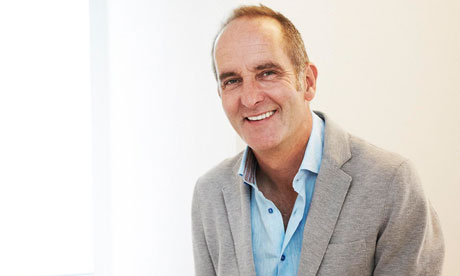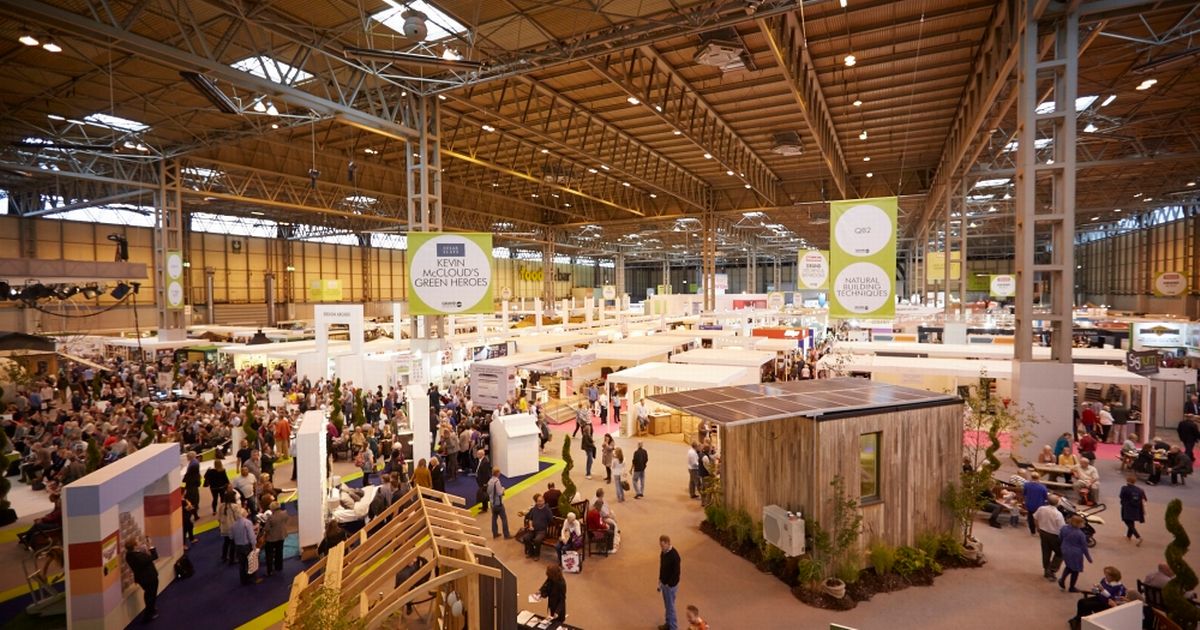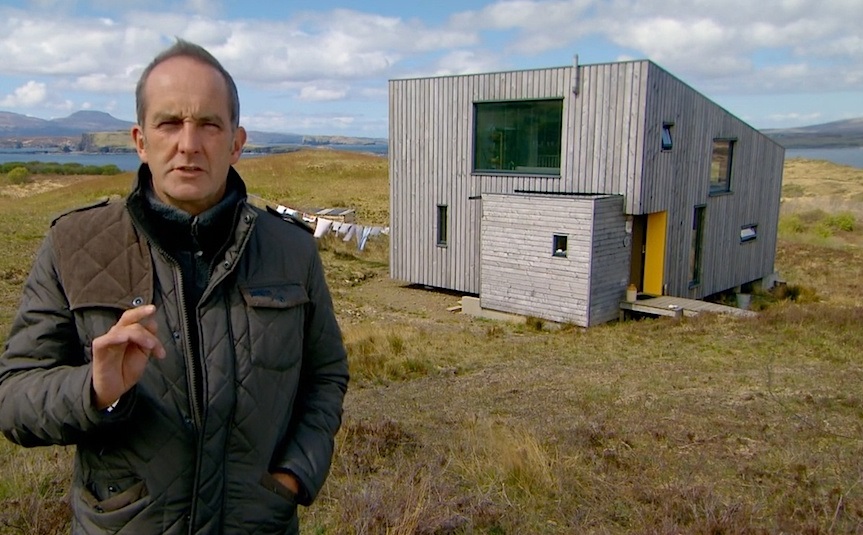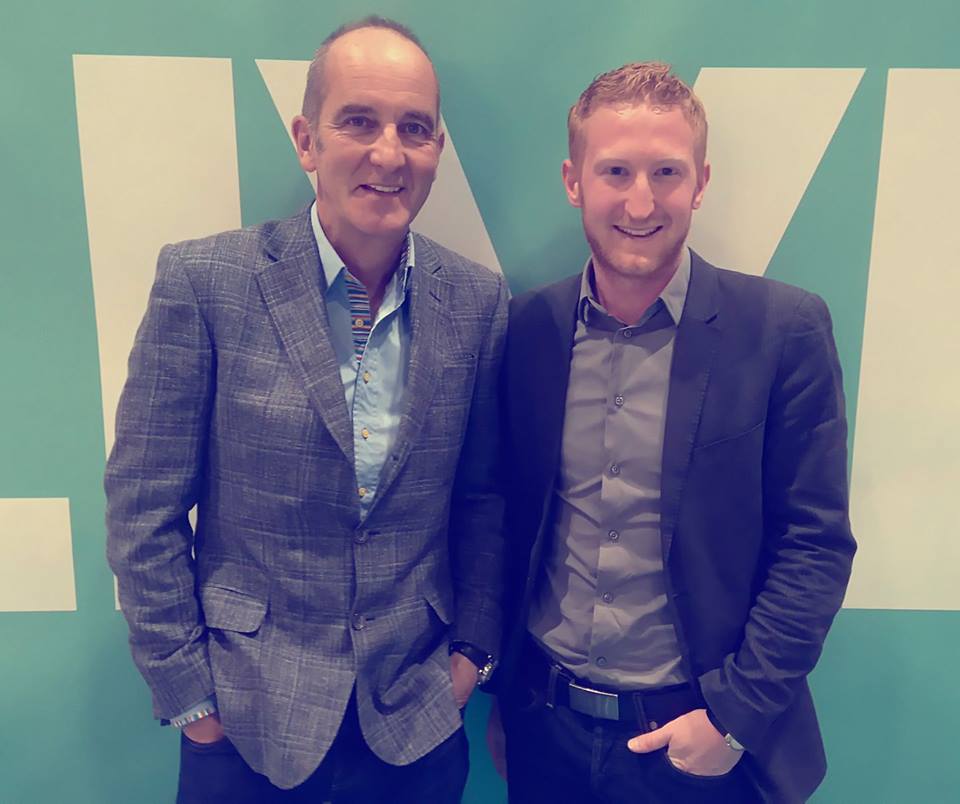Main author
Michael BrooksInterview with Kevin McCloud 2017
The man behind the much-loved TV programme 'Grand Designs', which first aired in 1999, Kevin McCloud is one of the UK's most popular presenters.
Having trained and worked as a professional designer, McCloud lends an air of calm expertise to the show which documents people as they embark upon their ambitious and often unconventional self-build projects.
As well as authoring a number of books and presenting several other programmes such as 'Man Made Home' and 'Escape to the Wild', McCloud hosts Grand Designs Live, one of the leading property/design exhibitions.
Designing Buildings Wiki met up with McCloud at London's Grand Designs Live exhibition, and spoke with him about self-build personality types, eco buildings, the snap election, and more...
| Designing Buildings Wiki (DBW): How has Grand Designs Live evolved over the years? Have the type of visitors changed much? |
Kevin McCloud (KM):
Yes, I think our visitors have changed. They seem to have become more serious over the years, we get a lot of professionals here now.
They certainly enjoy a political bent; if we run an on-stage seminar with some kind of self-build or professional housing agenda, it’s always hugely well-attended. It’s become an event at which we can air and promote ideas quite effectively.
| DBW: You've said that one of your favourite books is 'Zen and the Art of Motorcycle Maintenance' ... do you think the romantic or the rational personality type lends itself more suitably to pursuing a self-build 'grand design' project? |
KM:
It’s said that in most serious decisions the heart must rule the head. As a species we are given to believe that rationality should be the guiding light, but actually the truth is that in most of the biggest decisions in life – marriage, houses, children – we act very impulsively and tend to post-rationalise.
E.M. Forster said that it’s only when you connect the id and the ego, the rational and emotional, that you truly win because then you have at your disposal all those resources.
I suspect, in design and building, as in any other discipline, it simply isn’t good enough just to connect, you also need to understand where and how you’re connecting, and to exploit very consciously the energy that can be found in that relationship between the emotional and the rational.
Certainly, the design process is one which uses a great deal of rational truths, but nevertheless also marshals more chaotic and creative processes as well. Most people think of architecture and landscape design as being creative disciplines, but 98% of them are organisational.
When you start building, you begin to appreciate that beneath the T-shirts and hairy chests, most people in construction have remarkably fragile egos. It’s not hard to understand why, because unlike the more formal working environment, site work is chaotic, involves working in different weathers, on locations that aren’t familiar, there’s so much that is always different. You are forced to cling to the few habits that you can muster and take with you.
But one of the things I come across again and again is the way in which positivity and hope are the principal drivers. I do believe that if you’re not an optimist you shouldn’t be building anything.
| DBW: What could local authorities do to provide more support for self-build? |
KM:
One of the most interesting elements of self-build that is going to emerge is in the social housing sector, where at the moment, a lack of provision, ambition and basic numbers from any national government suggests that we need to be finding ways of housing people that are more functional and less chaotic.
I’d like to see greater collaboration between local authorities, housing associations and builders in order to bring forward community and group self-build schemes along the lines of the German Vauban.
I’d like to see it happen in such a way that local authorities felt they could bring people together from the social housing list, advertise and work with that list to put together groups of people.
One of the problems you face as a builder is not knowing who your occupants are going to be. On mixed housing schemes, developers will know who the open market customers are but not the social housing residents, which seems to be inappropriate when you’re trying to encourage communities to flourish through bringing that scheme about collaboratively. It’s a small thing but it would be great to see more of that.
My other great wish, which I don’t think I’m ever going to see, is I’d like local authorities to value their land as a resource for building social capital on rather than as a balance sheet item.
So what they’d do is look at their land and refuse to lower its price for a social housing scheme because it’s going to damage their books and their credit rating. At the moment, they all use their land as one of the principal assets in establishing their credit rating and they’re terrified of going bust, or of actually producing a balance sheet which shows a negative net worth. It won’t happen, but if we started to try and measure social capital of organisations like local authorities, wouldn’t it be great?
| DBW: Do you think you can draw parallels between the drive and ambition of those pursuing their personal 'grand design' and the common criticism leveled at the construction industry as a whole that tends to favour 'spectacular' and bespoke design solutions rather than more reliable proven ones? |
KM:
I think you certainly can to some extent, but it really does depend on the individual and the individual project. Some of our contributors that we film on ‘Grand Designs’ very much pursue a line of reiterating something or trying to do it better, but not breaking moulds; whereas others are quite prepared to sell everything they have in pursuit of a technology, idea or an effect.
Certainly in my private business and our projects, we view being innovative and experimental as important, however as I say, it does very much depend on the particular project.
| DBW: In terms of retrofitting existing buildings and meeting good energy efficiency standards for new buildings, this country has something of a mountain to climb over the upcoming decades. If you could put one policy in the next government's manifesto that might take a positive step in the right direction, what would it be? |
KM:
There are many but the clever answer is the one that ties together taxation, incentives and energy saving measures. 26 million existing homes is a good target for retrofitting. The last government’s attempt at this failed spectacularly, and to an extent that failure led to the downfall of the Department of Energy and Climate Change (DECC).
The biggest single manifesto pledge from any of the parties would be the reinstatement, with teeth, of DECC, coupled with a commitment to driving energy efficiency and savings across all of the sectors but particularly the housing sector, with some clear legislation.
One thing that seems to be very obvious is that in order for tech to grow, in order for business to develop systems and solutions, whether it’s transportation, climate change or frozen foods, it needs legislation.
If government passes legislation and says ‘these are our targets, start working towards them’, it has an amazingly galvanizing effect on business. The reason is that business and R&D work on a 5-10 year cycle, government works on a 5-year cycle, so what business wants is the security of knowledge that legislation is still going to be in place down the line.
For example, Gordon Brown’s government committing to a reduction in greenhouse gases was a fantastic signal to industry. Subsequent governments have rowed back from it, but nevertheless, it had a powerful effect on business.
Whatever legislation comes into being you want to make sure it has cross-party support, that it is robust, really well-worded and designed to last, because at the moment we seem to be living in a culture where legislation pops on and off the statute books like anything. It would just be great to see a government that was serious about climate change. It won’t surprise you to hear that I’m a member of the Green Party!
[Designing Buildings Wiki with Kevin McCloud, May 2017]
The next Grand Designs Live show takes place 11-15th October 2017 at the NEC, Birmingham. For more details and to purchase tickets, see here.
[edit] Related articles on Designing Buildings Wiki
- David Trench - A career in projects.
- Interior designer.
- Interview with Julie Hirigoyen, UK-GBC.
- Interview with Kevin Borg, founder of KJB Building Consultants.
- Interview with Kevin McCloud 2018.
- Interview with Mark Farmer.
- Interview with Tom Dyckhoff.
- Kevin McCloud - 2017 Green Heroes.
- Owen Hatherley interview.
- Peter Barber - interview.
- Retrofit.
- Richard Rogers in conversation.
- Self-build home: project plan.
- Will Self interview.
Featured articles and news
The need for a National construction careers campaign
Highlighted by CIOB to cut unemployment, reduce skills gap and deliver on housing and infrastructure ambitions.
AI-Driven automation; reducing time, enhancing compliance
Sustainability; not just compliance but rethinking design, material selection, and the supply chains to support them.
Climate Resilience and Adaptation In the Built Environment
New CIOB Technical Information Sheet by Colin Booth, Professor of Smart and Sustainable Infrastructure.
Turning Enquiries into Profitable Construction Projects
Founder of Develop Coaching and author of Building Your Future; Greg Wilkes shares his insights.
IHBC Signpost: Poetry from concrete
Scotland’s fascinating historic concrete and brutalist architecture with the Engine Shed.
Demonstrating that apprenticeships work for business, people and Scotland’s economy.
Scottish parents prioritise construction and apprenticeships
CIOB data released for Scottish Apprenticeship Week shows construction as top potential career path.
From a Green to a White Paper and the proposal of a General Safety Requirement for construction products.
Creativity, conservation and craft at Barley Studio. Book review.
The challenge as PFI agreements come to an end
How construction deals with inherited assets built under long-term contracts.
Skills plan for engineering and building services
Comprehensive industry report highlights persistent skills challenges across the sector.
Choosing the right design team for a D&B Contract
An architect explains the nature and needs of working within this common procurement route.
Statement from the Interim Chief Construction Advisor
Thouria Istephan; Architect and inquiry panel member outlines ongoing work, priorities and next steps.
The 2025 draft NPPF in brief with indicative responses
Local verses National and suitable verses sustainable: Consultation open for just over one week.
Increased vigilance on VAT Domestic Reverse Charge
HMRC bearing down with increasing force on construction consultant says.
Call for greater recognition of professional standards
Chartered bodies representing more than 1.5 million individuals have written to the UK Government.


























